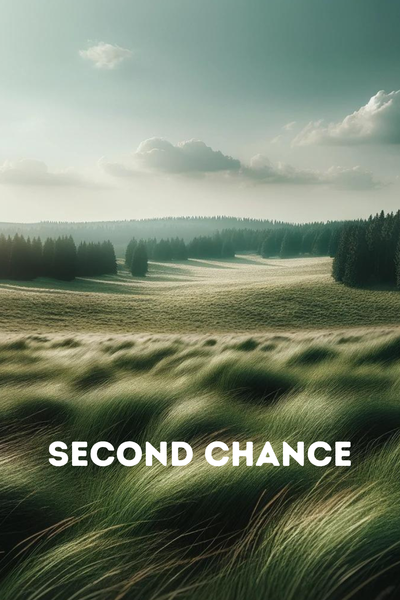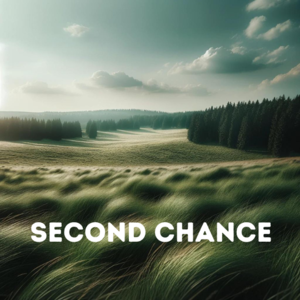I walked slowly inside the settlement. Roughly through the middle flowed a small but swift river, originating somewhere beneath that flat rock. It was about a meter and a half wide and at most half a meter deep. The settlement had two bridges over the river, built from several thicker logs laid side by side. I crouched by the river, first washed my hands and face, then took a drink. The water was ice-cold despite it being summer and the sun shining strongly. After quenching my thirst, I calmly began to look around the settlement.
Everywhere, people were busy. Everyone was young. In one workshop under the roof, five young women sat on primitive chairs, working intently at a table and on the ground. One of them had a small child sleeping on her back in something resembling a modern hiking baby carrier. I noticed that at least three of them were pregnant, though they looked very young, like teenagers. Next to them, two infants played on the ground. As I approached, all of them turned their heads towards me, greeted with a slight nod:
"Be well."
Then they returned to their work as if nothing had happened. They worked almost in complete silence, with only a few single words spoken now and then. Only the sounds of children and the tools they worked with could be heard. A bit further, the sound of a hammer clinking could be heard. I walked towards the sound.
It was a blacksmith's workshop. A simple furnace, forge, anvil, a large thick table made from a halved thick tree, and several large barrels of water standing on the ground. Three people worked there, one youth in a leather apron, about eighteen years old, and two small boys no older than seven or eight. One of the boys carried water from the river in small buckets and filled a barrel. The other busied himself at the forge. He wore no shirt, and his entire torso and face were dirty with smoke and ash. The youth pulled a glowing piece of metal from the furnace, struck it a few times on the anvil, dipped it into the water barrel for a few seconds, and then back into the furnace. Then he took out another piece of orange-glowing metal and monotonously repeated the procedure.
Right under the rock was a small shed, and next to it, a wooden structure resembling scaffolding. Three people stood on the scaffolding; from this distance, I could only distinguish their heights—one was an adult, and the other two appeared to be children or dwarfs.
I moved slowly towards the rock, looking around curiously. Everyone was busy, but as I passed by, each one greeted me in the same way with a nod of the head and a wish to be well. It was hard to understand how such a village functioned. No one knew me, where I was from, whether I was good or bad, yet everyone showed respect. I was just walking freely through the middle of the village, and no one even asked what I was looking for—I just came and was accepted. Roughly in the village's central place stood a hut larger than the others, with only three closed walls, and the open side facing west. I approached slowly and peeked inside. Inside, there were several large tables and benches made from halved tree trunks. At the back of the hut was something resembling a kitchen, a table, several small hearths, metal pots, and wooden bowls. In this primitive kitchen bustled two older women and several younger girls and boys. At one of the tables sat a middle-aged man, slightly older than me, with lightly graying hair and a short gray beard. Next to the table stood the boy who had brought me here, along with Black Fire. They were conversing animatedly with the seated man, but when they noticed me, the boy ran up to me smiling and pulled me by the hand to the table.
The older man stood up, bowed slightly with his hand on his chest, and introduced himself.
"Old Beetle," he said. "Welcome to Flat Rock. White Finger told me about your meeting."
"Arne," I introduced myself, mimicking his gesture.
"Sit at the table," Old Beetle invited. "There’s still time before evening; we can talk calmly before dinner."
He nodded slightly to White Finger, the boy whose name I had just learned. The boy took his basket and quickly exited the hut, followed by Black Fire.
I sat down opposite the man. The air was filled with the scent of herbs and perhaps cabbage. I was hungry, distinctly feeling a slight gnawing pain in my stomach, but at that moment, I was much more interested in talking with Old Beetle. I had many questions, but I wasn’t sure how to start. Fortunately, Old Beetle spoke first:
"White Finger said you come from the north, from the salty hills, and that you were in the city. Do you come from far away?"
The question wasn’t as simple as it seemed. I didn’t know how to respond because I wasn’t sure myself. I hesitated, whether to be totally honest and tell that I come from another world, or to invent some plausible story, just to ensure I wasn’t taken for a madman. After a few seconds of thought, I began timidly:
"I come from very far away, but unfortunately, I do not remember my journey. This morning I woke up in the forest about 15 kilometers to the north..."
At this moment, Old Beetle looked at me curiously, tilting his head slightly to the left and interrupted:
"How far? What is 'kilometers'?"
I realized that he was unfamiliar with metric measurements and quickly explained that a kilometer in our parts is a measure of a thousand big steps.
"A thousand..." Old Beetle murmured, then added, "That’s far. In cities, they use thousands."
"How do you measure distance?" I asked, intrigued.
"In building and crafting - fingers, steps, feet, and elbows, and in traveling, it’s days or half-days on foot or by cart," he answered smartly.
"What is the nearest city called? How far must one travel?" I asked, hoping that the first unknown from my list would be clarified.
"There are two cities," began Old Beetle, "to the north, Salty Hills, three days by wagon, and to the southeast, White Gardens, four days by wagon, or five if it rains."
"Do you often travel to the cities?" I asked, intrigued.
"Two or three times a year. It depends on the season and when the wagon is available."
"Do you have a wagon in the village?"
"No. The wagon is large and needed only for traveling with goods."
Old Beetle responded briefly and to the point, as if he didn't like to talk much. I decided to choose another question from my list of unknowns that might get the conversation going. So I asked about where their names and titles come from. Old Beetle began eagerly:
"When a child is born, the parents choose a name to distinguish it from others. Usually, the name is chosen based on the first few months of life, but sometimes even after 2 seasons. I am called Old Beetle because when I was little, I stayed with my mother while she was working with wicker, and I ate a large green beetle that came out of the stalks prepared for weaving. I was called Green Beetle, but now I am one of the elders in the village, so my name was changed to Old Beetle. The boy you met on the path, White Finger, has lighter skin on one finger, and the other one, who was with him when you came."
"Black Fire," I interjected.
"Yes, Black Fire," he confirmed and continued the story, "his father worked in the forge and he spent a lot of time there as a child. When he was in his second summer, he threw ash into the hearth and the fire flared up on his face. He had a black face for several days. Now he himself works in the forge and is a skilled blacksmith."
Old Beetle continued, providing examples and origins of names like Black Bush, Quick Frog, Crooked Knife, and many others more or less creative and humorous. I must admit that remembering such names is much easier for me than some Johan Hansen, Hans Johansen, Lars Andersen, or Anders Larsen. My world could be more interesting if we also used such creative names. Reflecting back to my childhood, in school, I was called Tooth because I had very large front teeth. I wonder what name I would have here, perhaps Crooked Tooth or Big Nose. One of my sisters as a baby had very large eyes; we joked that when she blinked, her eyelids had a long way to go. What would her name be? Maybe Big Eyes or Little Owl? My mood improved thinking about the alternative naming of people from my childhood.
I talked long with Old Beetle; he told about the village and its inhabitants, their activities and professions. About the cooperation between villages and about the fairs. I learned that their main export product is metal, or rather some kind of iron ore. They also have other products that they trade with nearby villages – feathers, wickerwork, baskets, and various products made from reeds and thin stems. From other villages, they receive, among others, hides, straps, grain, and oil.
I was reminded of old computer games where the main task was to care about supply and product exchange, transporting between settlements or cities, and developing your own virtual world. I paused for a moment in nostalgia; I had spent many hours of my childhood on this.
My moment of reflection was interrupted by movement in the hut. The villagers slowly gathered and sat down at the tables. The sun was already low in the west and was shining straight inside the hut with still warm rays.
"Dinner," said Old Beetle and waved to one of the young girls bustling about the pots. After a short moment, the girl brought a large bowl full of thick soup. The soup did not look like any dish I knew, but it smelled very appetizing. I was so hungry that I didn’t even consider what was in it; I began to eat greedily with a small wooden spoon. It was my first normal meal since the morning.











Comments (0)
See all